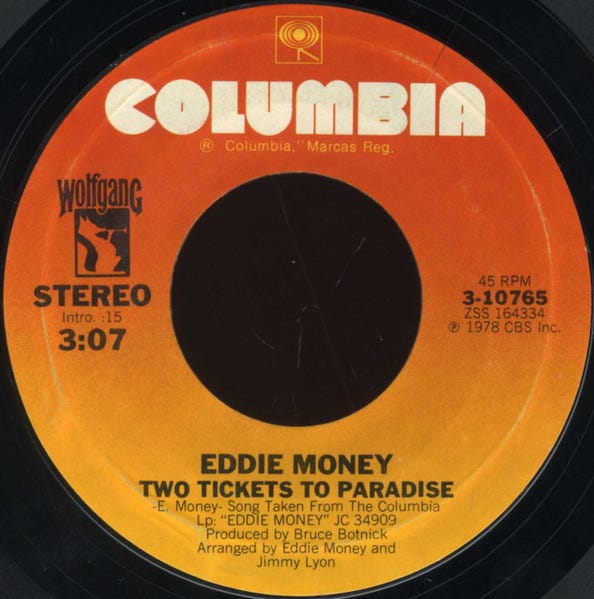Something That Both Of Us Have Always Wanted To Do
Eddie Money — "Two Tickets to Paradise" (1977)
Greetings, Jagged Time Lapsers!
And to all you new subscribers who have hitched a ride on the JTL spacecraft in the wake of my July 4th post, welcome — and thank you for interest and support!
Today’s post is for my paid subscribers — who, along with full access to the monthly episodes of the CROSSED CHANNELS podcast I’m doing with my friend and colleague Tony Fletcher, also get to read the various interviews I’ve done over the years with such disparate musical luminaries as Lemmy, Noddy Holder, Sergio Mendes, Ernie Isley, Esquivel, Cheech Marin, and (especially relevant to this particular post) Eddie Money, none of which have ever been published elsewhere in their entirety. And all that can be yours as well for the princely sum of five bucks a month, or $4.17 if you shell out for an annual subscription. Such a deal, right?
I have also occasionally been sharing chapters with my paid subscribers from my still-in-progress musical memoir. I don’t yet have a working title for the book, but the concept is similar to what my friend and colleague Josh Wilker did with his wonderful Cardboard Gods. Except where Josh used baseball cards from the 1970s as a means to make sense of his past, I’m using 45 rpm singles as a series of windows into my turbulent adolescence — a period of my life which coincided with some of the greatest music ever heard on AM (and FM) radio, as well as some of the absolute worst.
All the previous chapters I’ve written for the book — like the one about why a Jimmy Buffett 45 was one of the first singles I ever bought, or the one about how the film Grease mirrored my hellish entry to junior high, or the one about getting high for the first time to the sound of Foghat Live — can be found in the Jagged Time Lapse archive, which also contains a ton of free reads on my wide variety of musical obsessions.
I’ve been slacking on the memoir due to pressing deadlines for my latest book project (about the history of Electro-Harmonix, which will be published in the spring by Third Man), but I took a little time off from that this weekend to reboot my brain and finish this particular chapter about the rise and fall of my first band. Hope ya dig it!
“We should put a band together,” Pierre suggested one day while we were loitering against the chainlink fence that divided our junior high school’s handball courts from its semi-enclosed cafeteria. Well, “suggested” probably isn’t the right word; even at the age of 13, Pierre possessed an almost preternatural degree of self-confidence. Everything that came out of his mouth emerged with an air of absolute certainty, as if he’d already thoroughly examined all the angles of whatever he was talking about, and it was now up to you to go along with his pronouncements or be left behind in the dust.
On one level, I always kind of knew that Pierre was full of shit. But he was also so charismatic, funny, friendly and fearless that I genuinely enjoyed hanging out with him. The fact that cute girls were really attracted to him — tall and slim with olive skin, dark eyes and black, artfully feathered hair, he looked like a young Frank Langella recast as a SoCal surfer kid — and often came by to flirt with him while we were hanging out during our lunch breaks, also didn’t lessen my initial enthusiasm for our friendship.
Pierre and his beefier, far more reserved twin brother Louis — they were sons of a French-speaking Sephardic Jewish couple from Morocco — shared a bedroom in their parents’ rundown Spanish-style bungalow in L.A.’s Pico-Robertson neighborhood, and I spent more than a few weekend afternoons hanging out there with them in the spring of 1979, afternoons which usually involved us going over to browse at the funky little record store and head shop located a few blocks away on La Cienega.
Our musical tastes were fairly aligned. All three of us loved the disco and pop sounds coming out of our AM radios at the time, and I’d turned the brothers on to Chuck Berry and several other “oldies” artists via several spins of the American Graffiti soundtrack. So in Pierre’s mind, it made perfect sense that we should form a band — despite the fact that none of us really knew how to play an instrument.



